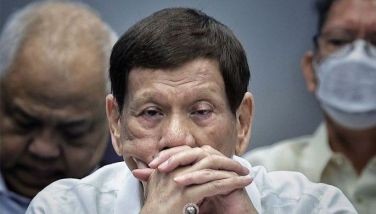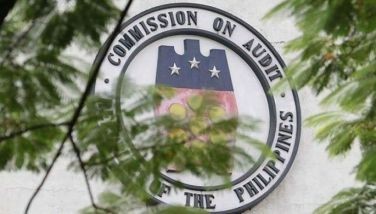Peso posts three-year high
February 4, 2006 | 12:00am
Sustained market optimism pushed the peso up further yesterday, sending the foreign exchange rate above the 52:$1 mark for the first time since 2002 to close at 51.91 to the dollar — the highest in over three years.
The peso last touched this level on Sept. 11, 2002 when the market closed at 51.90 to the dollar although, unlike today, the exchange rate was heading towards further depreciation at the time.
The currency market opened with the peso at 52:$1, slightly higher than Thursday’s close of 52.09. However, it was clear that the market was packing some momentum, fueled by fresh optimism over the increasing possibility of an upgrade by the major credit rating agencies.
Following the increase in the expanded value-added tax (EVAT) rate from 10 percent to 12 percent, markets have been expecting the major credit-rating agencies to upgrade their outlook from negative to neutral as the government’s fiscal crisis appeared to have abated.
Already, one of the United States’ largest pension funds, California Public Employees Retirement System (CALpers), has led the pack by giving the Philippines an improved rating compared to last year, placing it firmly in the fund’s list of permissible investment destinations.
"We expect further improvement in dollar inflows so that will provide additional support to the peso," said Bangko Sentral ng Pilipinas Governor Amando Tetangco Jr. "It will probably stay around this level, maybe a little over P52:$1 in the days to come."
Analysts said the market was celebrating the increase in the EVAT rate, which they said indicated the beginning of the end of the government’s fiscal problems.
Although the Arroyo administration is still deep in fiscal deficit, the gap is expected to narrow from P140 billion in 2005 to P125 billion this year. As its revenue base expands, the deficit is expected to be wiped out by 2008.
The EVAT is expected to generate from P80 billion to P120 billion in much-needed revenue.
Traders have been predicting the peso to strengthen further to as high as 51.88 to the dollar in the next few months and if this mark is breached, the peso would reach its highest level yet.
Tetangco, on the other hand, observed that there has been a "good two-way liquidity" in the market. He said dollar demand from manufacturing, oil and other dollar users was covered adequately by remittances from Filipino overseas workers as well as portfolio investments.
"Overall sentiments continue to be positive," Tetangco said.
According to Tetangco, the market was also reacting to the CALpers report that indicated the country’s ratings were on the way up after taking major steps to address the government’s fiscal problems.
In its latest ratings report, the Philippines was given a total score of 2.13 points, up from two points in 2005. This score increased the country’s ranking among 26 other emerging markets and moved it from the 18th position in 2005 to 14th in 2006.
Based on the Wilshire report, the Philippines surpassed its peers, Malaysia, China, Russia and India.
Officials said Wilshire’s rating was based on improvements in the country’s fiscal deficit as well as the passage of the EVAT law last year, which was considered a major step in improving the government’s fiscal standing.
"It’s a recognition of the government’s fiscal and economic reforms that should make the Philippines attractive to investors," Tetangco said of the Wilshire report.
The country’s financial markets reacted favorably when the EVAT went into effect last Nov. 1.
The Arroyo administration is struggling to rein in a burgeoning budget deficit, which economic analysts warn could throw the government’s anti-poverty program off track.
The EVAT tax is considered the centerpiece of Mrs. Arroyo’s fiscal reforms that are intended to forestall a looming Argentina-style fiscal crisis.
Mrs. Arroyo has also implemented measures to reduce spending and cut red tape, as well as launching a crackdown on corruption, tax evasion and smuggling.
But critics charge the expanded tax would result in higher inflation because electricity and petroleum are no longer EVAT-exempt.
President Arroyo expects the country’s sovereign credit rating to be upgraded once it implements the expanded tax.
A better rating would mean lower cost of borrowing for government, while a credit rating downgrade makes it more difficult for the country to attract investors as well as to secure foreign borrowings.
International credit rating agencies Moody’s Investors Service, Standard & Poor’s and Fitch Ratings all downgraded their credit rating outlooks on the Philippines in July when the Supreme Court halted its implementation due to questions on the tax law’s legality.
In a report shortly after the expanded tax went into effect in November, the World Bank said the Philippines must sustain its economic and fiscal reforms in order for it to bring back investor confidence and revitalize its fragile economy.
It said reforms must "also include improvements in the efficiency and transparency of public expenditures, so that more Filipinos, especially the poor, would benefit from the increase in additional revenues."
Rampant tax evasion, corruption, bloated state subsidies and protectionism have been blamed for the government’s fiscal woes.
The peso last touched this level on Sept. 11, 2002 when the market closed at 51.90 to the dollar although, unlike today, the exchange rate was heading towards further depreciation at the time.
The currency market opened with the peso at 52:$1, slightly higher than Thursday’s close of 52.09. However, it was clear that the market was packing some momentum, fueled by fresh optimism over the increasing possibility of an upgrade by the major credit rating agencies.
Following the increase in the expanded value-added tax (EVAT) rate from 10 percent to 12 percent, markets have been expecting the major credit-rating agencies to upgrade their outlook from negative to neutral as the government’s fiscal crisis appeared to have abated.
Already, one of the United States’ largest pension funds, California Public Employees Retirement System (CALpers), has led the pack by giving the Philippines an improved rating compared to last year, placing it firmly in the fund’s list of permissible investment destinations.
"We expect further improvement in dollar inflows so that will provide additional support to the peso," said Bangko Sentral ng Pilipinas Governor Amando Tetangco Jr. "It will probably stay around this level, maybe a little over P52:$1 in the days to come."
Analysts said the market was celebrating the increase in the EVAT rate, which they said indicated the beginning of the end of the government’s fiscal problems.
Although the Arroyo administration is still deep in fiscal deficit, the gap is expected to narrow from P140 billion in 2005 to P125 billion this year. As its revenue base expands, the deficit is expected to be wiped out by 2008.
The EVAT is expected to generate from P80 billion to P120 billion in much-needed revenue.
Traders have been predicting the peso to strengthen further to as high as 51.88 to the dollar in the next few months and if this mark is breached, the peso would reach its highest level yet.
Tetangco, on the other hand, observed that there has been a "good two-way liquidity" in the market. He said dollar demand from manufacturing, oil and other dollar users was covered adequately by remittances from Filipino overseas workers as well as portfolio investments.
"Overall sentiments continue to be positive," Tetangco said.
According to Tetangco, the market was also reacting to the CALpers report that indicated the country’s ratings were on the way up after taking major steps to address the government’s fiscal problems.
In its latest ratings report, the Philippines was given a total score of 2.13 points, up from two points in 2005. This score increased the country’s ranking among 26 other emerging markets and moved it from the 18th position in 2005 to 14th in 2006.
Based on the Wilshire report, the Philippines surpassed its peers, Malaysia, China, Russia and India.
Officials said Wilshire’s rating was based on improvements in the country’s fiscal deficit as well as the passage of the EVAT law last year, which was considered a major step in improving the government’s fiscal standing.
"It’s a recognition of the government’s fiscal and economic reforms that should make the Philippines attractive to investors," Tetangco said of the Wilshire report.
The country’s financial markets reacted favorably when the EVAT went into effect last Nov. 1.
The Arroyo administration is struggling to rein in a burgeoning budget deficit, which economic analysts warn could throw the government’s anti-poverty program off track.
The EVAT tax is considered the centerpiece of Mrs. Arroyo’s fiscal reforms that are intended to forestall a looming Argentina-style fiscal crisis.
Mrs. Arroyo has also implemented measures to reduce spending and cut red tape, as well as launching a crackdown on corruption, tax evasion and smuggling.
But critics charge the expanded tax would result in higher inflation because electricity and petroleum are no longer EVAT-exempt.
President Arroyo expects the country’s sovereign credit rating to be upgraded once it implements the expanded tax.
A better rating would mean lower cost of borrowing for government, while a credit rating downgrade makes it more difficult for the country to attract investors as well as to secure foreign borrowings.
International credit rating agencies Moody’s Investors Service, Standard & Poor’s and Fitch Ratings all downgraded their credit rating outlooks on the Philippines in July when the Supreme Court halted its implementation due to questions on the tax law’s legality.
In a report shortly after the expanded tax went into effect in November, the World Bank said the Philippines must sustain its economic and fiscal reforms in order for it to bring back investor confidence and revitalize its fragile economy.
It said reforms must "also include improvements in the efficiency and transparency of public expenditures, so that more Filipinos, especially the poor, would benefit from the increase in additional revenues."
Rampant tax evasion, corruption, bloated state subsidies and protectionism have been blamed for the government’s fiscal woes.
BrandSpace Articles
<
>
- Latest
- Trending
Trending
Latest
Trending
Latest
Recommended
































